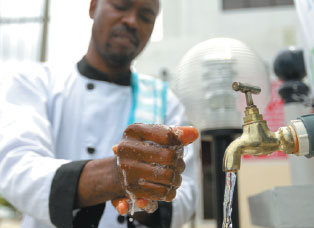Ebola outbreak threatens food security
Epidemic puts harvests at risk, boosts prices; UN warns crisis will worsen
The world's worst Ebola epidemic has put harvests at risk and sent food prices soaring in West Africa, the UN Food and Agriculture Organization said on Tuesday, warning the problem will intensify in coming months.
The FAO issued a special alert for Liberia, Sierra Leone and Guinea, the three countries most affected by the outbreak, which has killed about 1,550 people since the virus was detected in the remote jungles of southeastern Guinea in March.
Restrictions on people's movements and the establishment of quarantine zones to contain the spread of the hemorrhagic fever has led to panic buying, food shortages and price hikes in countries ill-prepared to absorb the shock.
"Even prior to the Ebola outbreak, households in some of the most affected areas were spending up to 80 percent of their incomes on food," said Vincent Martin, head of an FAO unit in Dakar that is coordinating the agency's response.
"Now these latest price spikes are effectively putting food completely out of their reach," Martin said in a statement, adding that the food crisis could hinder containment of the disease, which is typically spread via the bodily fluids of the sick.
Rice and corn production will be scaled back during the fast-approaching main harvest season as migration and movement restrictions cause labor shortages on farms, the FAO said.
Cash crops like palm oil, cocoa and rubber will be seriously affected, squeezing the purchasing power of many families, who will also lose income and nutrition due to the ban on bush meat.
Border crossing closures and the reduction of trade through seaports have tightened food supplies in the three countries, which are all net cereal importers, and propelled prices upward. Higher transport costs exacerbated the problem.
The UN World Food Program and FAO have approved an emergency measure to deliver 65,000 metric tons of food to 1.3 million people affected by Ebola over a three-month period.
The price of cassava at a market in the Liberian capital Monrovia rose 150 percent in the first weeks of August, the FAO said, adding that currency depreciation in Sierra Leone and Liberia was likely to force prices up further.
30-minute test
Japanese researchers said on Tuesday they had developed a new technology to detect the presence of the Ebola virus in 30 minutes.
Professor Jiro Yasuda and his team at Nagasaki University said their process is also cheaper than the system currently in use in West Africa.
"The new method is simpler than the current one and can be used in countries where expensive testing equipment is not available," Yasuda said by telephone.
"We have yet to receive any questions or requests, but we are pleased to offer the system, which is ready to go," he said.
Yasuda said the team had developed what he called a "primer", which amplifies only those genes specific to the Ebola virus found in a blood sample or other bodily fluids.
Currently, a method called polymerase chain reaction, or PCR, is widely used to detect the Ebola virus, which requires doctors to heat and cool samples repeatedly and takes up to two hours.
"The new method only needs a small, battery-powered warmer and the entire system costs just tens of thousands of yen (hundreds of dollars), which developing countries should be able to afford," he added.
Reuters - AFP
|
A man washes his hands at a medical facility in Abuja, Nigeria, on Monday. Afolaby Sotunde / Reuters |
(China Daily 09/03/2014 page12)









